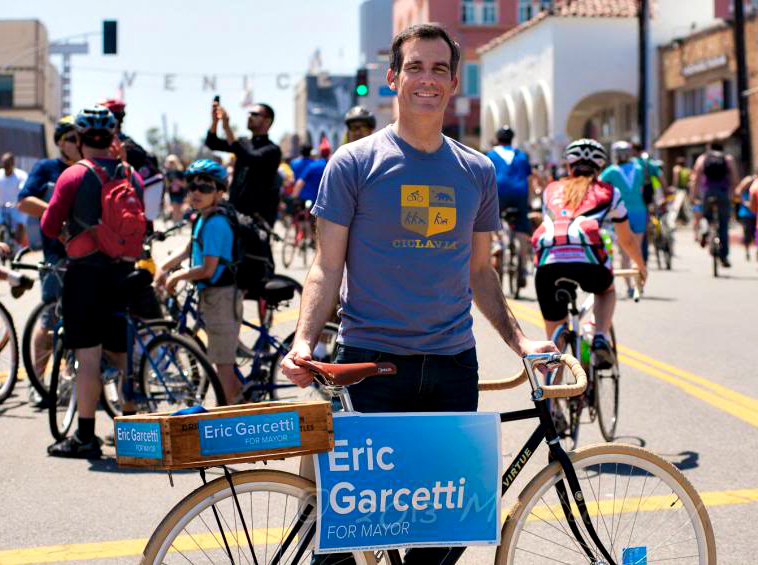By Drew Gregory Lynch.
Los Angeles mayor Eric Garcetti announced on Sunday night that he will not enter the California governor’s race, posting on Twitter that he wants to continue the work he is doing at City Hall.
“We have a lot of work left to do to build a stronger city, state and nation and I know I can best build on our progress here in L.A.,” he wrote. “I am passionate about my city and my family; both are here in Los Angeles.”
The announcement came as little surprise, as few believed Garcetti would enter the crowded field that includes Lt. Gov. Gavin Newsom who has already built a robust campaign war chest and enters the race as the frontrunner. Garcetti’s decision is likely welcome news for former L.A. mayor Antonio Villaraigosa, as the two would have been competing for not only votes in the heavily Latino Southern California region – but donors as well.
Also, the mayor polled relatively poorly last spring in early surveying of the race.
Furthermore, rumors that Garcetti is setting the groundwork for a White House run have swirled for months – rumors fueled by his recent trips to places like New Hampshire and Wisconsin. He is also scheduled to visit the early primary state of South Carolina later this year.
While the mayor has been largely mum on possible aspirations to seek the 2020 Democratic nomination, the 46-year-old Garcetti has stressed a need for new blood and fresh energy in a party still reeling from a crushing defeat last November.
“I have a job I love,” Garcetti said at the Democratic National Committee’s annual meeting in Nevada earlier this month.
A jump to the White House would be unprecedented, however, as no politician has ever gone from city hall to Pennsylvania Avenue without other stops in between.
Garcetti finds himself in a unique position within the Democratic Party nationally. While he backed Hillary Clinton and is aligned with the establishment roots of the party, he has also unabashedly backed progressive measures like single-payer health care – policy proposals longtime Democratic figures like Sen. Dianne Feinstein have been hesitant to embrace.
At the same time, he’s taken a less aggressive tone in speaking out against President Trump’s agenda in Washington, largely avoiding the more hyperbolic rhetoric from other California leaders like Senate President Pro Tem Kevin de León, House Minority Leader Nancy Pelosi, and Rep. Brad Sherman, D-Calif.
For example, in his second inaugural address in July, Garcetti didn’t mention President Trump by name, and instead struck a more unifying and pragmatic tone.
While those words sufficed after he was overwhelmingly elected as mayor, if he decides to run, Garcetti may be required to pivot towards appealing to an audience eager to hear a tougher anti-Trump message – especially coming from a state that has positioned itself at the center of the so-called “resistance” against the GOP agenda.
“I think all the rules are off,” Garcetti told a Wisconsin TV station this summer. “No African American could be president until one was. No reality star could be president until one is.”
[divider] [/divider]





